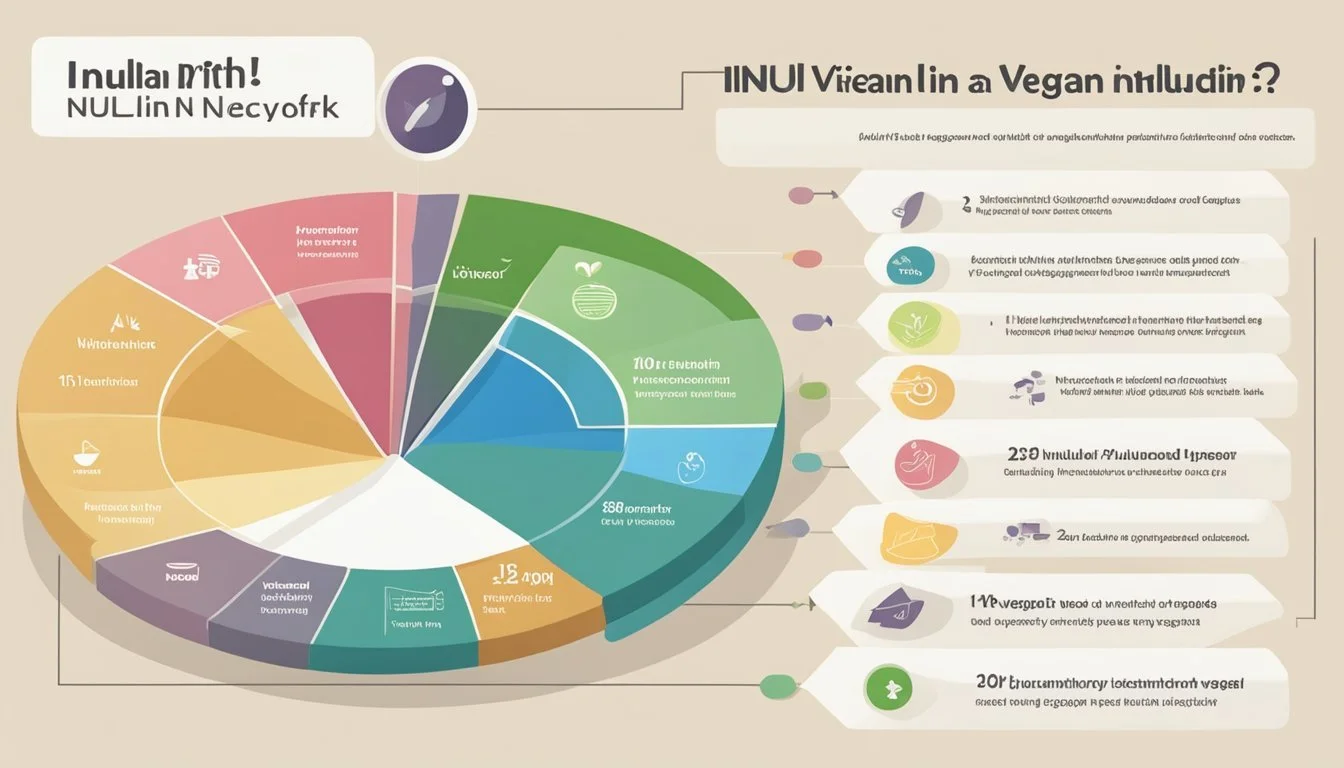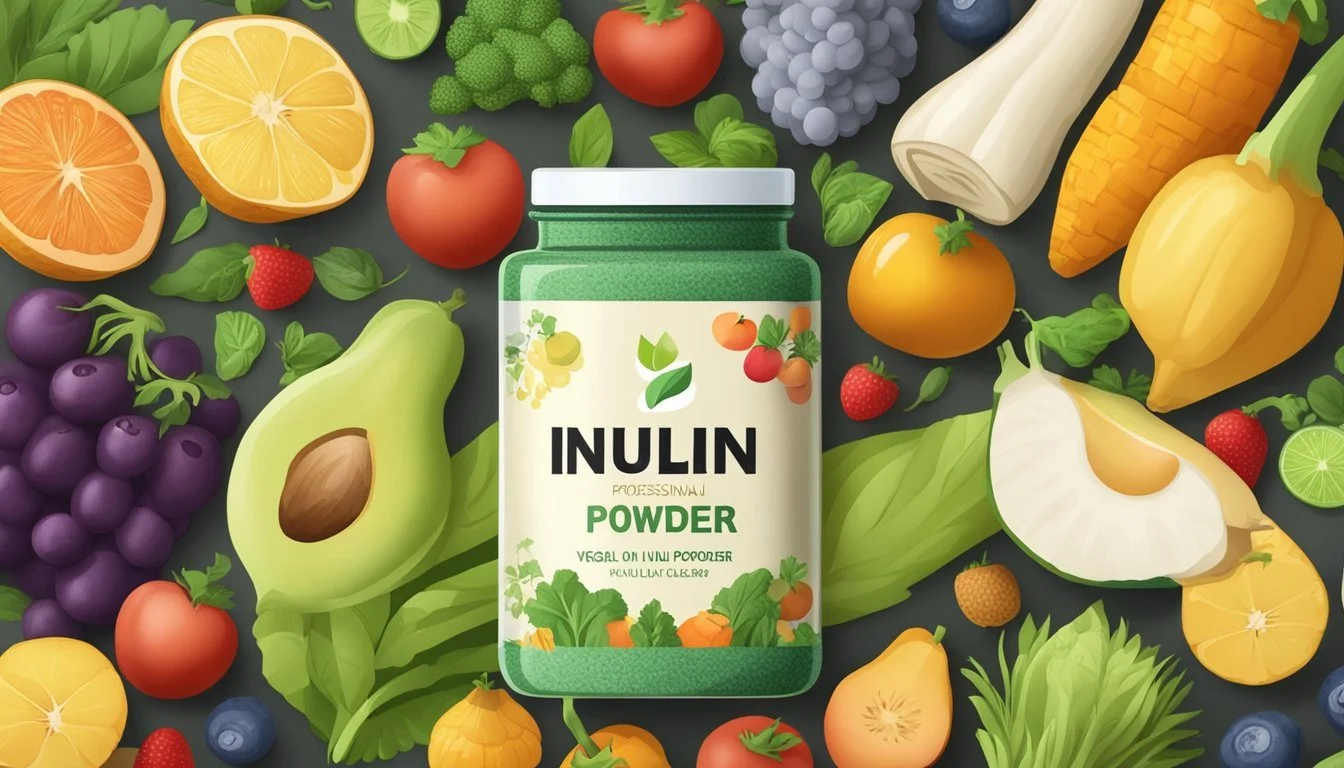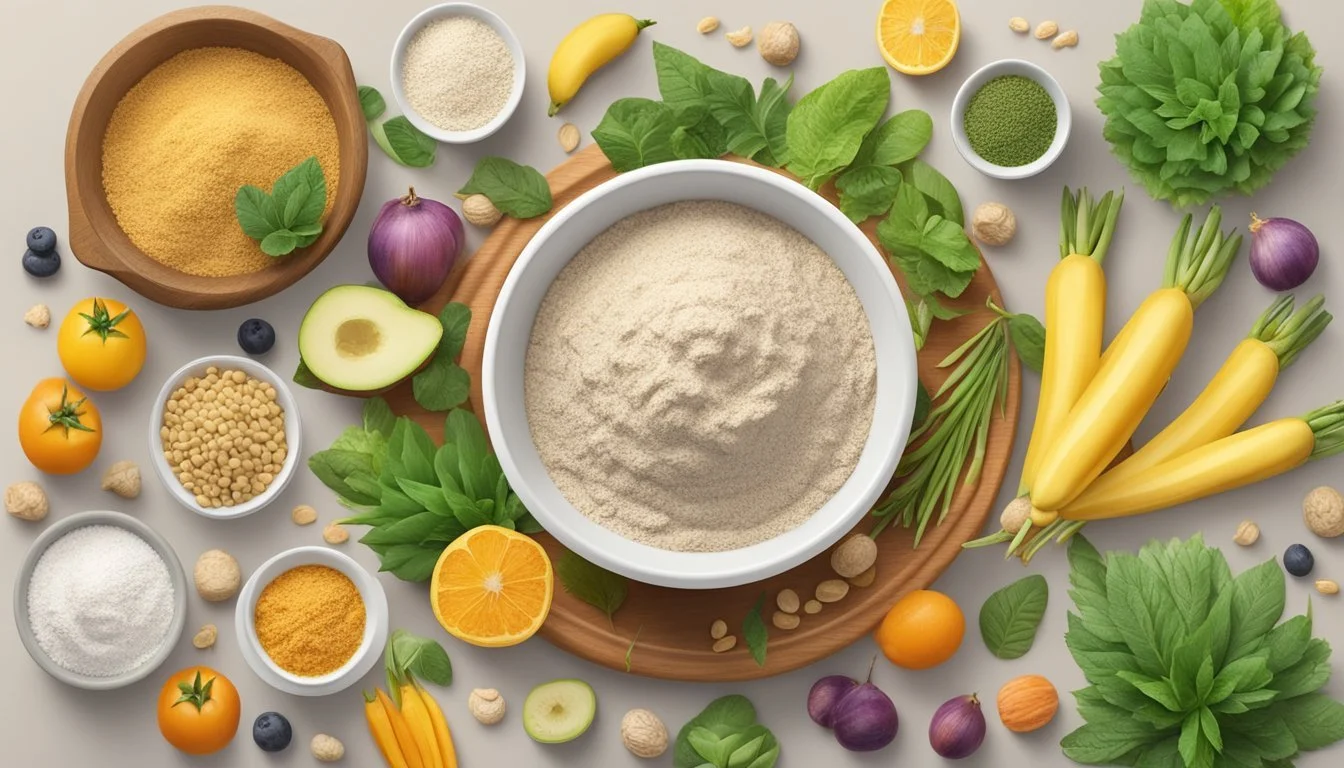Is Inulin Vegan?
Debunking Myths About Plant-Based Fibers
Inulin is a plant-based compound, specifically a type of soluble fiber found in a variety of vegetables, such as chicory root, Jerusalem artichokes, (What wine goes well with artichokes?) and garlic. As a fructan, it is composed of chains of fructose molecules that are not digested in the small intestine, instead, making their way to the large intestine where they serve as a food source for beneficial bacteria. This process qualifies inulin as a prebiotic, which is instrumental in promoting gut health and a balanced microbiome.
The question of whether inulin is vegan is straightforward—being naturally derived from plants, inulin itself is inherently vegan. This makes it a suitable ingredient for those following a plant-based diet. It is essential, however, to note that while inulin is vegan, not all products containing inulin are necessarily vegan, as they may include other non-vegan ingredients.
Consumers following a vegan lifestyle are encouraged to examine product labels to ensure that all components align with their dietary choices. In addition to its dietary fiber benefits, inulin's role as a prebiotic means it supports gut bacteria vital for a healthy digestive system, further contributing to its value in a vegan diet.
What Is Inulin?
Inulin is a natural dietary fiber present in many plants, commonly extracted for various health benefits. It plays a crucial role in promoting gut health due to its prebiotic nature.
Defining Inulin as a Carbohydrate
Inulin is categorized as a polysaccharide, belonging to a subset of carbohydrates known as fructans. Its primary function is as a storage carbohydrate in plants. Distinguished as a form of soluble fiber, inulin is not digestible by human digestive enzymes, which allows it to pass through the small intestine and ferment in the large intestine, feeding beneficial bacteria.
Inulin Sources and Types
This carbohydrate is found in a variety of plants, particularly:
Chicory root
Jerusalem artichokes
Onions
Leeks
Garlic
Certain grains
Some fruits
Legumes.
The most abundant source is chicory root, from which inulin is often extracted for dietary supplements or food ingredients. There are different types of inulin, including high-performance (HP) inulin and fructooligosaccharides (FOS), each varying slightly in its chemical structure and length.
Chemical Structure of Inulin
Inulin's chemical structure comprises chains of fructose units linked together with a terminal glucose unit. These linear chains form a type of oligosaccharide, specifically known as fructans. The bonding in these chains prevents them from being absorbed in the small intestine, thus contributing to their prebiotic effect after reaching the colon.
Inulin and Veganism
In this section, you'll learn about the relationship between inulin and veganism, including its sources and whether it is derived from animal products. Understanding these aspects is crucial for vegans seeking to incorporate inulin into their diet.
Is Inulin Derived from Animal Products?
Inulin is a type of soluble fibre that is not derived from animal products. It is a plant-based carbohydrate commonly found in a vast array of vegetables and is categorized as a fructan. This means inulin is composed of fructose molecules linked in a way that is not digested in the small intestine, but instead, it reaches the large intestine where it supports gut health by promoting the growth of beneficial bacteria.
Vegan-Friendly Sources of Inulin
Vegan diets are rich in plants that naturally contain inulin. Here are some vegan-friendly sources:
Vegetables: Including but not limited to:
Chicory root
Onion
Garlic
Artichokes
Leeks
Asparagus
Fruits: While not as rich a source as vegetables, certain fruits contain smaller amounts of inulin:
Bananas
Watermelon
Grapefruit
Grains: Some grains also offer this prebiotic fiber:
Barley
Wheat
Inulin found in chicory root is particularly notable due to its high concentration, making it a common source for inulin extracts and supplements. It is important for vegans to source their inulin naturally from a varied diet of vegetables, fruits, and grains to ensure a balanced intake of fiber and nutrients.
Health Benefits of Inulin
Inulin, a prebiotic dietary fiber, offers several health benefits centered around digestive health, microbial balance, and blood sugar regulation. It is a naturally occurring oligosaccharide found in various plants that is integral to an optimal gut environment and overall health.
Inulin's Role in Digestion
Inulin is classified as a soluble fiber which means it dissolves in water and forms a gel-like substance in the gut. This can help to slow digestion, leading to a feeling of fullness and potentially aiding in weight management. By moderating digestion, inulin can also play a part in the regulation of blood sugar levels, reducing the likelihood of spikes and crashes that can occur after meals.
Effects on Bacterial Flora
As a prebiotic, inulin has a significant role in fostering beneficial gut bacteria. These bacteria are crucial for not just digestive health but also for immune function and synthesizing certain vitamins. The fermentation of inulin by gut microbes helps to maintain a balanced and diversified gut microbiome, which is essential for overall health.
Impact on Blood Sugar Control
Inulin's ability to modulate digestion holds benefits for blood sugar control. By slowing gastric emptying, it lessens the rate at which sugars are absorbed into the bloodstream. This steady absorption can aid in maintaining healthier blood sugar levels, which is particularly advantageous for individuals wanting to manage their weight or those who have diabetes.
By contributing to these key areas of health, inulin demonstrates its role as a valuable component of a balanced diet and underscores the health benefits it confers to those who include it in their dietary regimen.
Nutritional Profile of Inulin
Inulin is a type of dietary fiber that offers a low-caloric addition to a vegan diet, while serving as an excellent source of soluble fiber. It possesses a unique nutritional profile characterized by its non-digestibility in the small intestine, which allows it to pass to the large intestine where it serves as a food source for beneficial bacteria.
Caloric Content of Inulin
Inulin contains approximately 1 to 2 calories per gram, which is significantly lower than the 4 calories per gram found in most carbohydrates. This reduced caloric content makes inulin a popular choice for those looking to manage their caloric intake without compromising on their nutritional needs.
Inulin as a Source of Fiber
Type: Soluble fiber
Benefits: Promotes digestive health; aids the growth of beneficial gut bacteria
Food Sources: Derived from natural sources like chicory root and agave
Inulin is distinguished by its high fiber content, which can aid in maintaining a healthy digestive system. As a soluble fiber, it absorbs water which can add bulk to the stool and promote regular bowel movements. Furthermore, it acts as a prebiotic, providing nourishment for the gut microbiota and playing a crucial role in overall gut health. Inulin does not contribute to protein content, but its role as a fiber-rich component makes it a valuable addition to a nutritious diet.
Potential Side Effects
While inulin is a beneficial prebiotic fiber that supports gut health, some individuals may experience adverse digestive side effects. Understanding these effects can help manage inulin intake appropriately.
Digestive Discomfort Associated with Inulin
Inulin can lead to digestive discomfort in some individuals. This discomfort typically manifests as bloating, gas, and in some cases, abdominal discomfort. Because inulin is a fermentable fiber, it is broken down by gut bacteria, which can produce gas and cause discomfort. In certain individuals, inulin may also trigger constipation or diarrhea, affecting the regularity of the digestive system.
Inulin and FODMAPs
Inulin falls under the category of FODMAPs (Fermentable Oligo-, Di-, Mono-saccharides And Polyols), which are a group of carbohydrates known to cause issues in individuals with irritable bowel syndrome (IBS) or sensitive digestive systems. These short-chain carbohydrates can draw extra water into the bowel and may be fermented by bacteria in the gut, leading to increased gas, bloating, and abdominal discomfort. Consequently, individuals adhering to a low FODMAP diet are often advised to limit or avoid inulin to prevent these side effects.
Inulin as a Dietary Supplement
Inulin supplements offer a convenient way to increase dietary fiber intake, especially for individuals seeking the benefits of this prebiotic fiber. They are often derived from chicory root and come in various forms to suit different dietary preferences and needs.
Forms and Types of Inulin Supplements
Powdered Inulin: The most common form, typically derived from chicory root. It is versatile and can be easily mixed into liquids or soft foods.
Capsules: For those who prefer a fixed dosage in pill form; convenient for travel and on-the-go.
Gummies: Flavored chewables containing inulin, popular among those who might dislike the taste of powder or have difficulty swallowing pills.
Appropriate Inulin Dosage
Starting Dose: Begin with a small amount, such as 2-3 grams per day, to assess tolerance.
Gradual Increase: If well-tolerated, incrementally increase the dose by 1-2 grams weekly.
Maintenance Dose: A typical daily dose ranges from 5-10 grams, although some may benefit from higher amounts based on individual health goals and professional recommendations.
Additional Considerations
In understanding the suitability of inulin for vegans, it's imperative to consider its impact on various health conditions and the importance of consulting healthcare professionals for personalized advice.
Inulin for Specific Health Conditions
Inulin, being a soluble fiber, can influence the management of certain health conditions. Specifically, research has indicated its potential benefits for individuals with type 2 diabetes due to its ability to moderate blood glucose levels and improve insulin sensitivity. For those managing obesity, inulin may aid in weight management thanks to its satiating effect, which could lead to reduced calorie intake. Moreover, inulin’s role in modulating gut health may have implications for diseases like inflammatory bowel disease, as it promotes the growth of beneficial gut bacteria. Cholesterol levels might also be better regulated with inulin use, potentially lowering the risk of cardiovascular diseases. However, individuals with specific health conditions, especially those with sensitivities like irritable bowel syndrome (IBS), might experience digestive discomfort due to inulin's classification as a FODMAP.
Consulting with Healthcare Professionals
When incorporating inulin or any supplement into one's diet, consulting with healthcare professionals is crucial. They can provide tailored advice, especially for individuals with pre-existing conditions like diabetes, cancer, or those with heightened insulin resistance. Healthcare professionals can assess the potential impact of inulin on an individual’s health and prescribe the right dietary modifications. They can also offer guidance on inulin's interaction with medications and how it might affect one's immunity or other health aspects. This professional input ensures safe and beneficial use of inulin tailored to one's unique health needs.
The Role of Inulin in Food Production
In the context of food manufacturing, inulin is employed as a functional ingredient, specifically as a substitute for fat and enhancer of product texture and quality. It helps in reducing calories without sacrificing taste in a variety of processed foods.
Inulin as a Fat Substitute
Inulin is often utilized to replace fat in food products due to its ability to mimic the mouthfeel that fat provides, while being lower in calories. This soluble fiber can contribute to a creamy and smooth texture in reduced-fat products. As an ingredient, inulin is a component of foods aiming to offer lower-calorie options without compromising the organoleptic properties, such as:
Dairy Products: Yogurts, ice creams, and cheese spreads.
Baked Goods: Cookies, cakes, and pastries.
Condiments: Salad dressings and sauces.
Benefits in Food Texture and Quality
Texture Enhancement: Inulin's addition to food products can improve texture by adding a certain degree of bulk and mouthfeel typically associated with full-fat alternatives. It has a stabilizing effect, which is particularly advantageous in emulsified systems.
Quality Improvement: Utilizing inulin in food production enhances aspects such as taste and overall quality, allowing products to maintain desirable sensory attributes. Manufacturers can use inulin to create products that are not only lower in calories but also meet consumer demand for better-for-you ingredients:
Processed Foods: Employed as a texture modifier in low-fat or reduced-sugar products.
Fermentation: Inulin serves as a substrate for probiotic bacteria in fermented food items, potentially contributing to gut health benefits.
Inulin's role is multidimensional in food production, catering to both technical requirements of manufacturing and the growing consumer demand for nutritionally improved foods.
Frequently Asked Questions
In this section, readers will find direct answers to common questions regarding inulin, its dietary implications, and its health benefits with a focus on a vegan lifestyle.
Common Inquiries About Inulin
Is inulin a vegan-friendly ingredient?
Inulin is plant-based, derived from vegetables such as chicory root, and is considered vegan.
How does inulin impact digestion?
Inulin acts as a soluble fiber, aiding digestion by increasing bowel movement regularity, thereby helping to alleviate constipation. However, it may cause flatulence in some individuals due to its fermentability.
Can inulin play a role in weight management?
Yes, inulin can contribute to weight management as it helps promote satiety and has minimal calories, making it a valuable addition to a weight-conscious diet.
Does inulin affect blood sugar levels?
Inulin has a low glycemic index and may help maintain blood sugar levels, potentially benefiting individuals monitoring their blood sugar.
Can inulin assist in controlling cholesterol?
Regular consumption of inulin may have a positive effect on cholesterol levels, thus contributing to heart health.
Does inulin consumption affect mineral absorption?
Inulin might enhance the absorption of minerals such as calcium and iron, which are crucial for bone health and blood formation, respectively.
Are there vitamins present in inulin?
Inulin itself does not contain vitamins, but it can aid in the better absorption of certain vitamins produced by gut bacteria.
Could inulin impact triglyceride levels?
Research suggests high-performance inulin may help in the management of triglycerides, thereby supporting cardiovascular health.







